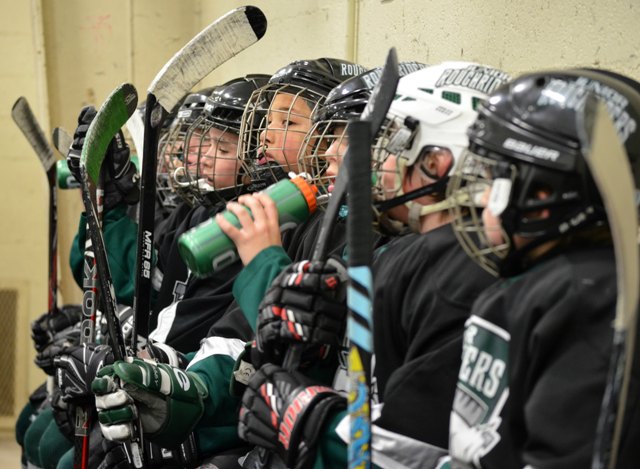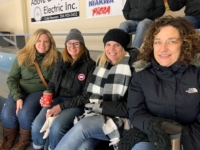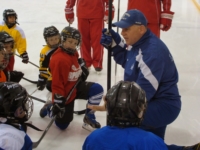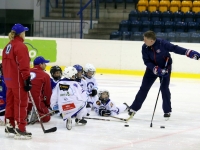As a minor hockey coach, you just want the best for your team. You want them to have a fun, exciting season, and make friends with their teammates along the way. You want them to learn a lot from you and each other, and to grow both as people in general and as hockey players. Also, you want them to experience success: the feeling of winning a hard-fought hockey game after working together with each other and giving their all. Sometimes that’ll happen; your team will pull out amazing and well-deserved victories, and they’ll all be beaming and excited for their next practice and the game to follow. Unfortunately, it can’t always work out that way.
Sometimes your team will have to suffer defeats. They’ll feel disappointed at playing well and working so hard and still being beaten by their opponents. But that’s the game of hockey. Losses happen, and the important thing for the players is to take the loss in stride, learn from their mistakes, and come back the following week ready to give it their all. When dealing with minor hockey players, however, especially at the younger levels, it can be very difficult to motivate your team as the coach after losing a game. Heck, even professional hockey players have a tough time accepting defeats now and again.
So, what’s the best way to help your hockey team bounce back from a loss so they can focus on winning their games to come? Here are four tips for refocusing and motivating your minor hockey team after losing a game:
Keep a Positive Mindset
Keeping a positive mindset is one of the most important things in any sport, including hockey. It’s especially important to stay positive following a loss. In fact, it’s just as important for the coach as it is for the players on the team.
For the coach, it’s important to remember that all sports, including hockey, have variance. Variance is the idea that games can be won or lost based on uncontrollable factors. The outcome of hockey games is determined by many things. Some factors are controllable, like effort, focus, and skill. Some factors, however, are uncontrollable, like injuries and other luck-based events. Some games are lost simply due to variance. This is unavoidable. So, if your team loses their first few games or goes on a big losing streak, keep a positive mindset and remember that variance does play a role in the losses. The important thing is to keep teaching your team and developing their skills so that they have the best chance of bringing home a win the next time around.
For your players, it’s important to remind them of variance too. However, it may not be helpful to suggest to your team that the outcomes of their games are based on luck. Rather, you should remind them that giving a fantastic effort doesn’t always lead to fantastic plays. Sometimes the shots don’t work out. Sometimes you’ll lose control of the puck or miss some important passes. No athlete is perfect. The important point is staying positive and keeping their effort at 100%, even when they’re not experiencing success on the ice. Just remind them that “Mistakes are Okay and can be fixed over time,” and to try and stay positive for the games to come.
Focus on Effort
As a coach, you should constantly remind your team that their skill and progress isn’t measured by individual outcomes. Sure, your team may have lost a few games in a row. But if the team members showed incredible effort and performed exceedingly well, then they were successful games! It can be very comforting to your players to hear that, especially after a loss. So, make sure to focus on your team’s effort, not their results. The two are often correlated, but not always.
Learn from the Game
Yes, your team may have played poorly and made many mistakes in their last game. But, that’s okay! Mistakes are actually a great thing, because they can be used as examples to learn from and become better for the future. As a minor hockey coach, that’s exactly what you should be doing for your team: emphasize learning.
Constantly using your team’s losses as a learning tool will allow your players to become more comfortable with making mistakes and losing in general. Of course, they’ll never like losing, but they’ll be able to bounce back from losses much faster and will learn more from them. After every game, especially the losses, be sure to go over what your team did well and what they didn’t. Then, go over how they can improve the things they didn’t do well. Finally, reiterate what you want to see from your team in terms of improvement for the next game. Once again, having a learning structure in place for when your team loses will get your players comfortable with losing. Soon, your team won’t bat an eyelash at a loss; they’ll take it in stride and stay focused for the next game.
Focus on the Future
The final thing to remind your team after a loss is to focus on the future. There will always be another hockey game, or another hockey season. Insist that the team doesn’t get caught up in past results or past performances, because both of those can change drastically from game to game. Emphasizing future opportunities plays a huge role in keeping your team’s motivation and morale high. Pair this tip with “learning from the game” to get your team excited about their future games and having a chance to improve their performance and take home a win.
Apart from any of the tips mentioned previously, it can be very helpful to remind your team that playing hockey is supposed to be fun. Keep their minds on positivity, effort, learning, the future, and on the fun of the sport. Remind your team that every opportunity they get to play hockey with their teammates is a blessing that many kids wish they had. So, win or loss, the focus should be split between developing as a hockey player and enjoying the sport.
If you remind your players to keep fun in mind and apply the tips mentioned, you’ll have no problem getting your team to bounce back from any loss, no matter how devastating. That way, everyone will keep their eye on the prize and you can focus on what you do best: teaching hockey.






